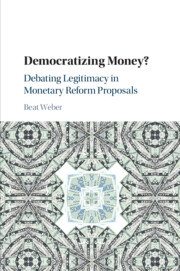Description
Democratizing Money?
Debating Legitimacy in Monetary Reform Proposals
Author: Weber Beat
Provides an economic analysis of current, post-crisis monetary reform proposals, including Bitcoin, sovereign money, regional money and Modern Monetary Theory.
Language: English
Subject for Democratizing Money?:
Approximative price 30.28 €
In Print (Delivery period: 14 days).
Add to cart
Democratizing Money?
Publication date: 08-2022
Support: Print on demand
Publication date: 08-2022
Support: Print on demand
Approximative price 120.25 €
In Print (Delivery period: 14 days).
Add to cart
Democratizing Money?
Publication date: 05-2018
284 p. · 15.5x23.5 cm · Hardback
Publication date: 05-2018
284 p. · 15.5x23.5 cm · Hardback
Description
/li>Contents
/li>Biography
/li>
A lack of confidence in monetary institutions after the recent financial crash has led to a resurgence of public debate on the topic of monetary reform, reaching a level of political prominence unprecedented since the period after the Great Depression. Whether privatizing money with Bitcoin, regionalizing it with regional currencies, or turning it into a state monopoly with either sovereign money or 'Modern Monetary Theory, the only economic utopians able to draw public attention in our post-crash world seem to be monetary reformers. Weber provides the first proper economic analysis of these modern monetary reform proposals, exposing their flaws and fallacies through critical examination. From academics studying the political economy of finance to economic sociologists studying financial institutions, this book will appeal to scholars and students interested in monetary reform proposals and the viability of alternative currency systems, and more broadly, readers seeking a contemporary understanding of what money is and how it works today.
1. What makes money legitimate?; 2. Current monetary systems; 3. The political economy of monetary reform; 4. Bitcoin; 5. Regional money; 6. Sovereign money; 7. Modern Monetary Theory; 8. Money and democracy in perspective.
Beat Weber is an Expert at the European Affairs and International Financial Organizations Division of the Austrian National Bank, and a Ph.D. candidate in political economy at Universität Kassel, Germany. He co-edited and authored The Political Economy of Financial Market Regulation (2006), as well as publishing a number of books and articles in German on the political economy of finance, and now devotes his research to investigating monetary reform and alternative currencies.
© 2024 LAVOISIER S.A.S.




